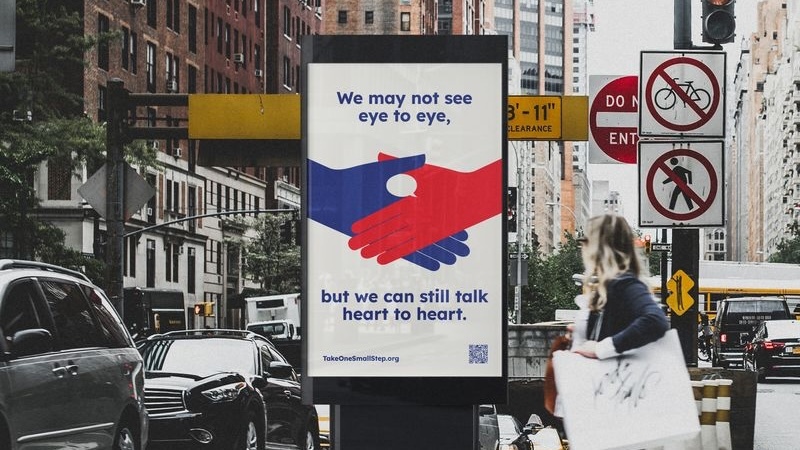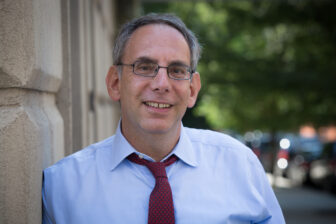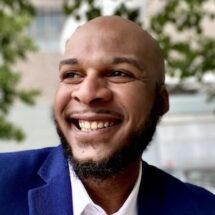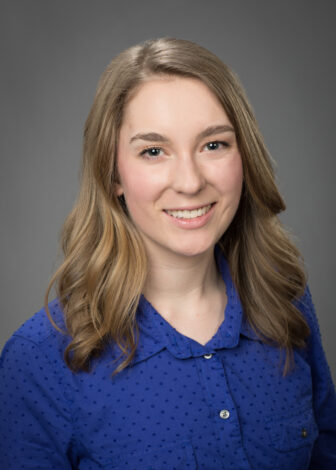StoryCorps scales up initiative to bridge political divides

A mockup of a One Small Step billboard ad.
The StoryCorps initiative that unites people with differing political views in conversation is now open to anyone interested in connecting with someone across the aisle.
One Small Step America, which launched in July, has begun rolling out a multi–million-dollar PSA campaign to encourage people to sign up for virtually moderated one-on-one discussions with people of different political persuasions anywhere in the U.S.
The national campaign is a scaled-up version of One Small Step, which piloted in communities in 2017 and officially launched with public radio station hubs in 2021.
Last fall, StoryCorps founder and president Dave Isay and CEO Sandra Clark saw the “tsunami of the election coming towards us and felt like we had a moral responsibility to get this to some kind of national scale,” Isay said.
The initiative aims to address “perceptual polarization” and “change social norms around the idea that it is possible for us to talk to people across political divides,” Isay said.
“We believe that the other side is much … crazier and more evil than they actually are,” Isay said. “So what we’re trying to also do is let people realize that no matter what side you are on across the political spectrum, most people are just sane, normal human beings and that our neighbors are not our enemies.”

Interested participants go to takeonesmallstep.org and fill out a form with information about their lives, politics and demographics. Potential participants are given matches and can choose who they want to talk to. If the other party agrees, they have a video conversation through the One Small Step Connect digital platform.
The platform, which was created for this project, has “all kinds of bells and whistles to make sure that it doesn’t go off the rails,” Isay said, including a “get me out of here button” and AI “to see if there are terms or words that indicate this is not going to go well and then suggest to people that they can get out of this.”
But among the more than 5,000 people who have participated in a One Small Step conversation, those off-the-rails conversations are rare, Isay said.
“We wouldn’t be doing this if not for having seen over the years that we’ve been testing it through public media that these overwhelmingly go incredibly well,” Isay said.
Some have even led to friendships, including a connection between Alton Russell, former chair of the Republican Party in Columbus, Ga., and Wane Hailes, former president of the local chapter of the NAACP.
‘An uphill fight’
Some people might find One Small Step conversations “terrifying,” said Christopher Norris, chief strategy officer at StoryCorps, who oversees the One Small Step team. The team will work to normalize the conversations by spotlighting the success stories of people like Russell and Hailes as “champions” of the program.

“If you see other Americans doing it and doing it more than once and they’re normalizing it and they’re encouraging you to do it … you see that this is actually a righteous and relevant and replicable thing that can help solve a real problem in the country,” Norris said. “We think that using trusted messengers, everyday Americans, is the right way to go.”
One way the OSS team plans to spotlight “champions” is through live events this fall that will bring past participants on stage to discuss their experience, play previously unshared clips from their conversation, answer questions from audience members and “serve as a role model for those who may be either curious or skeptical,” Norris said.
The OSS team is experimenting with different ways of sharing stories that come out of OSS conversations and creating different types of content on digital and social platforms that can reach many people, not just public broadcasting audiences.
Norris says a “constant conversation” is taking place within StoryCorps about how to “tell this One Small Step story in snackable, witty, funny, cool, light-hearted ways that aren’t the traditional two to three minutes that you hear on NPR. They’re also thinking about how to reach people outside the “public media bubble,” he said, such as young people and those who are politically disengaged.
The interviews aren’t the tear-jerkers typical of the standard StoryCorps interviews between people who know each other, Isay said. The 50-minute One Small Step conversations are often similar, he said, with people “feeling each other out,” but they often end with people interested in staying connected.
“What happens in these interviews is in some ways more powerful than what happens in a standard StoryCorps interview,” Isay said. “I think people are just genuinely surprised by what they find when they sit down and talk to someone across the divide.”
Isay doesn’t gloss over the challenge of getting people to participate. He wants as many people to sign up as possible but recognizes that “it’s going to be an uphill fight to figure out how to get people to do this.”
To build awareness of the program, an $8 million PSA campaign with billboards, TV and radio spots will begin ramping up in the coming weeks.
Another challenge is getting conservatives to sign up.
“It’s much harder for us to reach conservatives,” he said. “So all of our effort, everything is focused on reaching conservatives. Our billboards are placed where we can reach conservative communities. … We have partnerships with Glenn Beck and others to reach conservative audiences.”
StoryCorps has partnered with the NFL to get the word out about One Small Step and to encourage people to sign up. The NFL posted a video on Instagram earlier this month in which players discuss the importance of bridging political divides. The video links to the sign-up page for an OSS conversation.
The NFL Network will begin airing an OSS commercial in week two of the season and is considering other ways to share the message, according to a StoryCorps spokesperson. StoryCorps is not paying the NFL for the messaging.
Isay said he also thinks that escalating political tensions could drive people to sign up, especially after the election, when people are looking to bridge the divide.
“I think this kind of thing is always needed, but if there’s a moment when …people are just saying ‘Enough’ — like, ‘We’ve got to figure this out’ — we want to have the muscle built to be ready to step in and have as many people participate in this as possible.”
One Small Step is also looking to expand its reach and to continue helping participants down the path of civic dialogue through the forthcoming launch of the Next Step Network.
The network will be a partnership among One Small Step and other organizations “so that a person’s civic journey doesn’t stop after one initial intervention,” Norris said. “So when someone comes to us and they finish an OSS conversation, we want to point them” to engage with like-minded civic nonprofits, he said.
Station participation
As One Small Step goes national, public radio stations are continuing to participate. So far, more than 30 stations have taken part, including a new cohort of station hubs that was announced earlier this year. The stations include Central Florida Public Media in Orlando; WGVU in Grand Rapids, Mich.; WJFF in Liberty, N.Y.; Vermont Public; WTIP in Grand Marais, Minn.; WERU in Blue Hill, Maine; and KUNR in Reno, Nev. The hub stations are supported with CPB funding.
KUNR was also among the first hub stations in 2021. This time, the station will focus less on facilitated discussions and more on training. It will host a live panel in October with the Nevada Humanities with past OSS participants, according to Natalie Van Hoozer, community engagement coordinator and program lead for One Small Step at the station.

Van Hoozer will also train KUNR reporters about how they can “apply the ideas and the methodology of One Small Step to their reporting beat,” she said.
Van Hoozer, who also led the program at the station in 2021, said the biggest challenges have been matching people who are different enough in their beliefs and getting more conservative participants.
To recruit participants, “we look for those spaces where it’s a hub for all people in the community, not just people who have a certain ideology or a certain background,” Van Hoozer said. She said she sees an opportunity to do more outreach with churches and faith-based entities.
The benefit of OSS is that it centers community members as the story, Van Hoozer said. “They’re not just a voice in a larger piece,” she said. Community members have told Van Hoozer “that they appreciate hearing those stories where their fellow community members are the piece,” she added.
In 2021 and so far this year, she has seen “high rates” of participants wanting to exchange contact information after a conversation.
As for OSS participants, the program provides “a nice example of how to have a structured, thoughtful conversation that hopefully they can take into their other life experiences when they’re looking to have those difficult conversations with people that they know,” Van Hoozer said. “And it also takes away some of the stigma of what other people can be.”
This story has been updated to reflect that StoryCorps reduced the expected cost of its PSA campaign from $10 million to $8 million.






